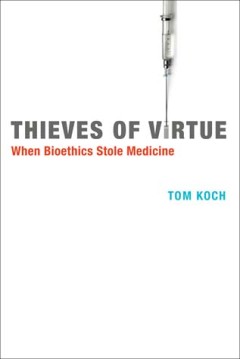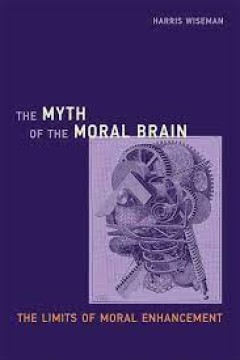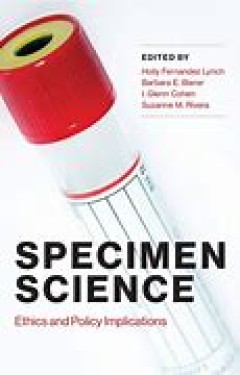Filter by

Human Dignity, Human Rights, and Responsibility :the New Language of Global B…
Title from PDF title page (viewed on Oct. 11, 2012)."'Human dignity' has been enshrined in international agreements and national constitutions as a fundamental human right. The World Medical Association calls on physicians to respect human dignity and to discharge their duties with dignity. And yet human dignity is a term--like love, hope, and justice--that is intuitively grasped but never clea…
- Edition
- -
- ISBN/ISSN
- 9780262305815
- Collation
- 1 online resource (xiv, 349 pages) :illustrations.
- Series Title
- -
- Call Number
- -

Bioethics in the age of new media / Computation, Aesthetics, and Space
Joanna Zylinska examines the ethical challenges presented by technology to the allegedly sacrosant idea of the human & makes a proposal for a new ethics of life rooted in the philosophy of
- Edition
- -
- ISBN/ISSN
- -
- Collation
- 1 online resource (xv, 230 pages)
- Series Title
- -
- Call Number
- -

Thieves of virtue :when bioethics stole medicine
Bioethics emerged in the 1960s from a conviction that physicians and researchers needed the guidance of philosophers in handling the issues raised by technological advances in medicine. It blossomed as a response to the perceived doctor-knows-best paternalism of the traditional medical ethic and today plays a critical role in health policies and treatment decisions. Bioethics claimed to offer a…
- Edition
- -
- ISBN/ISSN
- 9780262305532
- Collation
- 1 online resource (373 pages) :illustrations.
- Series Title
- -
- Call Number
- -

Re-reasoning ethics :the rationality of deliberation and judgment in ethics
How developing a more expansive, non-formal conception of reason produces richer ethical understandings of human situations, explored and illustrated with many real examples.OCLC-licensed vendor bibliographic record.
- Edition
- -
- ISBN/ISSN
- 9780262345637
- Collation
- 1 online resource (xvi, 296 pages).
- Series Title
- -
- Call Number
- -

Reframing Rights: Bioconstitutionalism in the Genetic Age
Legal texts have been with us since the dawn of human history. Beginning in 1953, life too became textual. The discovery of the structure of DNA made it possible to represent the basic matter of life with permutations and combinations of four letters of the alphabet, A, T, C, and G. Since then, the biological and legal conceptions of life have been in constant, mutually constitutive interplay -…
- Edition
- -
- ISBN/ISSN
- 9780262298667
- Collation
- 1 online resource (x, 310 pages).
- Series Title
- -
- Call Number
- -

The myth of the moral brain :the limits of moral enhancement
"Throughout history, humanity has been seen as being in need of improvement, most pressingly in need of moral improvement. Today, in what has been called the beginnings of "the golden age of neuroscience," laboratory findings claim to offer insights into how the brain "does" morality, even suggesting that it is possible to make people more moral by manipulating their biology. Can "moral bioenha…
- Edition
- -
- ISBN/ISSN
- 9780262333658
- Collation
- 1 online resource (340 pages).
- Series Title
- -
- Call Number
- -

Specimen Science: Ethics and Policy Implications
Legal, regulatory, and ethical perspectives on balancing social benefit and human autonomy in research using human biospecimens. Advances in medicine often depend on the effective collection, storage, research use, and sharing of human biological specimens and associated data. But what about the sources of such specimens? When a blood specimen is drawn from a vein in your arm, is that specimen …
- Edition
- -
- ISBN/ISSN
- 9780262339711
- Collation
- 1 online resource (440 pages).
- Series Title
- -
- Call Number
- -

Making modern medical ethics :how African Americans, anti-Nazis, bureaucrats,…
"A counter history of the birth of bioethics, which focuses on the dissenters and whistleblowers who challenged law and institutions rather than simply the development of new technologies"--OCLC-licensed vendor bibliographic record.
- Edition
- -
- ISBN/ISSN
- 9780262377416
- Collation
- 1 online resource.
- Series Title
- -
- Call Number
- -

Crowded out :the true costs of crowdfunding healthcare
"Crowded Out examines how charitable crowdfunding so quickly overtook public life, where it is taking us, and who gets left behind by this new platformed economy. While crowdfunding has become ubiquitous in our lives, it is largely misunderstood by the public: rather than a friendly free market "powered by the kindness" of strangers, crowdfunding is powerfully reinforcing inequalities and chang…
- Edition
- -
- ISBN/ISSN
- 9780262378611
- Collation
- 1 online resource
- Series Title
- -
- Call Number
- -

The structure of moral revolutions :studies of changes in the morality of abo…
OCLC-licensed vendor bibliographic record.
- Edition
- -
- ISBN/ISSN
- 9780262355322
- Collation
- 1 online resource (320 pages).
- Series Title
- -
- Call Number
- -
 Computer Science, Information & General Works
Computer Science, Information & General Works  Philosophy & Psychology
Philosophy & Psychology  Religion
Religion  Social Sciences
Social Sciences  Language
Language  Pure Science
Pure Science  Applied Sciences
Applied Sciences  Art & Recreation
Art & Recreation  Literature
Literature  History & Geography
History & Geography